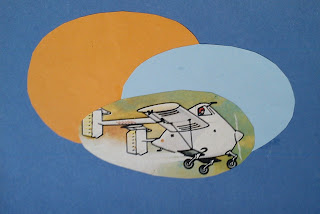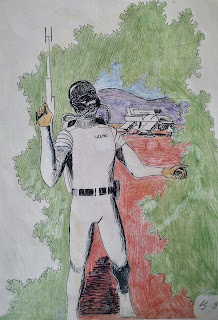Lennart Svensson lives on 62 degrees north in Sweden. Born in 1965 he's a walker of streets, a driver of cars, a drinker of tea. He has written the novels Burning Magnesium and Redeeming Lucifer. His bio can be read here. -- In the below story, a 31st century soldier shares his wisdom.
Going up the slope the turbines of the APC were pressed to the extreme. It was a shaky ride, we tumbled around each other in the dark compartment, but soon we came out on smoother ground and we gathered ourselves reasonably. The advance to storming distance continued.
This happened in the 3000s. The Tyrian Kingdom and the Masurian Dominate were at odds. It was open conflict, it was war. And squeezed in between these interstellar powers was Laconia, my world, a backwater solar system mostly known for its production of clay ocarinas. Masuria annexed us one day and the male population was forced into military service.
“March or die,” that was the situation. And after a few months of rather basic training we were sent to one of the front planets for our baptism of fire. Riding in that APC.
And now it stopped. A red lamp blinked: “unload”. We got out, led by a squad leader who formed us into line ahead in the gray day. With vizors down and gas filters on we advanced to the critical part of the combat zone. Basically, we would guide rocket ship strikes with our lasers.
And indeed, rocket ships roared in the sky. Smoke was on the wind. Eventually our company forged ahead in triangle formation against a shining horizon – a blazing horizon. When we saw this sea of fire we instinctively hit the dirt. But in the helmet radio we only heard, “forward!”
I radioed the squad leader, “But it’s burning over there!”
The answer came:
“Your suits are fireproof. No matter! And, damn you, no babble on the intercom! Only tactical messages!”
This order of “no babble” was my first lesson of the war. And it hides a profound wisdom. It can be applied to more than war and combat situations. Like, if you meet a wise man you don’t babble in his presence. You only ask pertinent questions. This is about
subordinating yourself to the situation, uttered in a “don’t babble” dictum.
We were in the combat zone. And we did get some share of the action, guiding those rocket ships toward the enemy target. And this included staving off assaults of enemy infantry too. That day I had my share of death and destruction. But even before going into battle I had internalized death, you might say. I knew I might die in this battle. During the transfer to this very planet, Lein IV, I had said to myself that "this is the way to dusty death” and that I shouldn’t be so sheepish about it. I thought: if I die in this battle I have to go out in style. I refuse to have the air of a lamb to the slaughter...!
So, in this way I was prepared for anything in that battle. And I did survive it.
Later, I also noticed how this wisdom, the process of “having conquered death inside” brought with it all the other, traditional soldiery virtues. Like courage, sobriety, loyalty. I needed no specific lesson in courage. I’d say, having already acquainted myself with death courage came naturally. Like, if during my career I was given a task with probable lethal outcome, I’d perform it without discussion. I didn’t worry about the lethal consequences because I already knew death, I had internalized it. In the same way, as a combat leader, I could give my men the most difficult, lethal missions thinkable. Because I, if given them, could have fulfilled them. Thus they could fulfil them too.
- - -
After my first fight I actually began appreciating being a combat soldier, forcibly enrolled or not. Now, this isn’t a story of the war. Nor is it a story of my part of it. But, it is a summary of the lessons I, Gustavus Pax, learned during this war, the Masurian War of 3009-3025.
Thus far, the lessons were:
no babble on the intercom, only tactical messages. And, the way of the soldier is the way of death.
Now for the other lessons...
Schlachta, August 4, 3016. Guarded by my staff group I had been sleeping under a tarpaulin, I had a breakfast of water and biscuits and then it was up and at them, continuing to enlarge a bridgehead after a forced landing. One of my platoons seemed to be stuck by a brook. I took my power cycle and went there, finding the platoon hiding behind a thicket and the platoon leader among them, studying a map.
“What are you looking at?” I asked over the radio.
“Captain, there are strong enemy forces on the other side of the brook. In a certain ruin.”
He showed me a point on the map, symbolizing a ruin of a power station. I said:
“Are you sure? Go out and have a look. Now! Get going!”
I followed the man and one squad out of the thicket and onto the brook, looking out over the dark waters and behind it, the supposed enemy shore, brown and desolate and with the stupendous ruin towering above it. No enemy presence was seen in or beside it.
“That’s it,” I said, “you see? Probably nothing there. Let’s have a look. Come on!”
I led the force in a patrol to the ruin, we approached it with all due caution – and, once there, it was found to be unoccupied.
I left the place for the platoon commander to hold. And from that position they soon knocked out an enemy counterthrust. The ruin had been deserted, was easy to group in and was fine for stopping such an advance.
All told, you mustn’t rely too much on maps – not on squad, platoon, company or even battalion level. As often as possible, the commander must go out himself to have the look and feel of the situation.
I render this wisdom as,
“reality, not the map, shall guide you”. This can make you think of the basic sobriety needed for a soldier. I mean, he does of course need visions and “get up and go,” an ability to strive for the impossible. But in all this he must also have a sober outlook. Like, exactly now, where is the enemy and what is he doing? This must always be the lodestar for any operation. A combat soldier isn’t just out in the field to camp. He’s out there to fight the enemy.
Keep your eyes on the target!
- - -
Another very important wisdom of the war is this:
nothing beats a folding stock...
You see, the laser carbines we used in the war came in two different versions: one with a folding stock, the other with a rigid butt-end – and this butt-end, apart from being a support against the shoulder, also served as a storage compartment for batteries.
But I never liked that one. Instead, the folding stock-version was my weapon of choice. Why? ‘Cos nothing beats a folding stock, that’s why...
- - -
Soldiering is a ritual. Being a soldier in an army means learning the codes, learning to speak in a certain manner.
This is my sixth wisdom. Some soldiers don’t understand this. They talk about “bullshit,” BS, as soon as anything has to be done by the book. Now, of course you don’t learn warring by reading about it in a book =
Krieg führen lernt man nicht aus Büchern... You can be a fine combat soldier after some “learning on the job” and no formal schooling. But, when it comes to leading a whole company you must also know about book keeping, the keeping of records, and the formal way of doing things (apart from intuitively grasping a battle situation, getting the feel of the battle as intimated above).
All this formality becomes almost enjoyable if you see it as a ritual. Filing reports and everything having to do with “the paper war,” communicating on the intercom according to the rules at hand, change of guards ceremonies etc. It’s all a ritual. If you don’t get it, if you can’t stand any of this, then don’t be in the army.
- - -
War stands for the archaic in the modern. This is my seventh wisdom.
We live in a modern culture, we hail the development of technology and science. And yet, we also make war. And in war there’s essentially nothing modern. We have modern weaponry and use technology to the utmost to be efficient killers – but – the situation of the soldier going to war is as old as Moses.
Me, boarding that troop carrier for Lein IV, internally grappling with death – that’s an archaic image. The fresh recruit stumbling into the fire – that’s archaic. Seeing death and destruction around you, learning to fight or die – that’s archaic.
And all this fought with modern weaponry such as orbo bombs, translocators, particle beams; all this with the whining of armoured aircraft, the sound of sweep electron pieces...
war stands for the archaic in the modern.
- - -
The war eventually ended and I kept on serving as an officer in the Masurian army. There were some border adjustments between Masuria and Tyria and a peace treaty was signed.
And so we lived happily ever after...?
As for war veterans, I know of many who succumbed to “post traumatic stress,” to psychic problems, to thoughts of suicide, sometimes succeeding in killing themselves. And still, they were guys on the winning side...!
It just goes to show that as a soldier, you must never relax. You’re always in the zone, always fighting something – the enemy without, or the enemy within.
Personally I’ve stayed alive in this way: as soon as I’m beset by thoughts of angst, maybe even suicide, I think: OK. I’m now under assault. I’m attacked by feelings of angst, of fear. But as a soldier I used to conquer my fear by thinking that death is but a moment, a natural ending of the life of my physical body.
The attack of angst must be counter-attacked in sober fashion. Conquered by will, in the same way as the fear of death during the war was conquered by will.
Thus, I live my life. You could say that I’m always at storming distance, always waiting to rise and rush forth and cover the last critical fifty meters to get to the target and take it.
In and out of war, you’re always at storming distance...
The war never ends. In a controlled fashion, I’m always fighting the enemy within.
You think that sounds weird? Welcome to the life of a combat veteran.
Or maybe it isn’t so weird. I guess we all have our angst to grapple with, soldiers and civilians alike. I do it in the soldiery fashion, conceiving of it in a soldiery way. That’s all.
- - -
Thus, in summation, my eight wisdoms are:
. No babble on the intercom.
. The way of the soldier is the way of death.
. Reality, not the map, shall guide you.
. Keep your eyes on the target.
. Nothing beats a folding stock.
. Soldiering is a ritual.
. War stands for the archaic in the modern.
. In and out of war, you’re always at storming distance.
Related
Johnnie Holt -- First on Mars
Burning Magnesium
Redeeming Lucifer

